|
|
|
Sort Order |
|
|
|
Items / Page
|
|
|
|
|
|
|
| Srl | Item |
| 1 |
ID:
171276
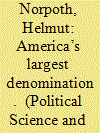

|
|
|
|
|
| Summary/Abstract |
By a measure of religious affiliation used by Gallup polls for nearly a century, the denomination with the largest following in the United States has always turned out to be “None,” ahead of Catholic, Methodist, Baptist, or any other faith. The existence of such a large flock without religious affiliation might be expected for a country with a Constitution guaranteeing freedom of and from religion. The secular portion of the American electorate has always been big enough to wield, potentially at least, political clout. Its partisan attachments have consistently favored the Democratic over the Republican side. What is limiting the electoral clout of the “Nones” today is that nearly half of them profess no partisan affiliation. They are Independents in matters of both church and state.
|
|
|
|
|
|
|
|
|
|
|
|
|
|
|
|
| 2 |
ID:
171279


|
|
|
|
|
| Summary/Abstract |
This research offers a post-mortem on political advertising in 2018, providing important context for 2018’s “blue wave.” In a majority of US House of Representatives races, there were more pro-Democratic than pro-Republican ads, including in the most competitive contests. The one theme that united pro-Democratic advertising was health care, which was mentioned in nearly three of every five Democratic ads in the fall campaign. Contrary to the narrative that television is declining, a record number of television ads aired in the 2018 midterms, whereas digital spending still constituted a small percentage of overall advertising spending for most candidate campaigns. Finally, there was a healthy volume of outside-group spending in 2018, with “dark-money” groups increasing their involvement—especially in support of Democratic candidates.
|
|
|
|
|
|
|
|
|
|
|
|
|
|
|
|
| 3 |
ID:
171290
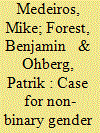

|
|
|
|
|
| Summary/Abstract |
LGBTQ activists and academics advocate the use of non-binary gender categories to include individuals who identify as neither rigidly male nor rigidly female to reflect the increasing number of people who do not place themselves in these two conventional classes. Although some general-population surveys have begun using non-binary gender questions, research has not examined the consequences of using (or not) a question with non-binary gender categories in surveys and censuses. Our study addresses this gap using a survey experiment in which respondents in the United States, Canada, and Sweden randomly received a binary or a non-binary gender question. We find no evidence of negative reactions to the non-binary question. Moreover, when there is a statistical difference, the reactions are positive. We thus conclude that general-population surveys could use a non-binary question without facing significant adverse reactions from respondents.
|
|
|
|
|
|
|
|
|
|
|
|
|
|
|
|
| 4 |
ID:
171292


|
|
|
|
|
| Summary/Abstract |
This article explores the value and application of using comic images to teach difficult political texts. We presented either visual or textual portions of the Constitution to 71 American 18- to 22-year-olds using Survey Monkey Audience, measuring and comparing their knowledge of the Constitution before and after viewing. Respondents viewing the comic of congressional duties experienced statistically significant gains in pretest to posttest mean knowledge scores. Respondents viewing the text also experienced an increase in mean scores pretest to posttest; however, these changes were smaller and not statistically significant. This indicates that students may better comprehend content from visual depictions of difficult texts. We conclude by providing an example of one way that we use comics of political texts as a tool for student learning in an international civics exchange program.
|
|
|
|
|
|
|
|
|
|
|
|
|
|
|
|
| 5 |
ID:
171284
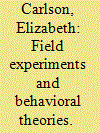

|
|
|
|
|
| Summary/Abstract |
The design of field experiments makes them inappropriate for testing many common political theories. These theories propose that certain factors—for example, income or information—affect how individuals make choices. To test these theories, researchers typically investigate the correlation between the relevant factor and individuals’ choices, holding other factors constant. Field experiments, in contrast, allow multiple factors to vary at once: they create real-world disruption and do not control how actors behave in response. Subjects’ choices will be affected by the experimental treatment as well as by other changes that occur as the larger system reacts. It will be difficult to isolate the effect of any one factor, particularly without a good preexisting model of the system and how it is likely to respond. If a field experiment will not tell us what we need to know, the benefit of the study cannot outweigh harm, and it also will be unethical.
|
|
|
|
|
|
|
|
|
|
|
|
|
|
|
|
| 6 |
ID:
171288
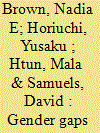

|
|
|
|
|
| Summary/Abstract |
The gender publication gap puts women at a disadvantage for tenure and promotion, which contributes to the discipline’s leaky pipeline. Several studies published in PS find no evidence of gender bias in the review process and instead suggest that submission pools are distorted by gender. To make a contribution to this important debate, we fielded an original survey to a sample of American Political Science Association members to measure participants’ perceptions of political science journals. Results reveal that the gender submission gap is accompanied by a gender perception gap at some but not all political science journals we study. Women report that they are more likely to submit to and get published in some journals, whereas men report as such with regard to other journals. Importantly, these gaps are observed even among scholars with the same methodological (i.e., quantitative or qualitative) approach.
|
|
|
|
|
|
|
|
|
|
|
|
|
|
|
|
| 7 |
ID:
171286
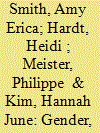

|
|
|
|
|
| Summary/Abstract |
Numerous studies document female scholars’ underrepresentation in political science publications and citations, yet few examine graduate syllabi. In this study, we assess the impact of instructors’ individual characteristics (i.e., race, gender, and age) on which readings they assign. We use what is—to our knowledge—the largest dataset of graduate readings to date: the GRaduate Assignments DataSet (GRADS), with 75,601 readings from 840 syllabi in 94 US PhD programs. We report several findings. First, overall, instructors infrequently assign female-authored scholarship relative to the rates at which women publish. Second, instructors who are women, people of color, and those from more gender-equal countries assign significantly more female-authored readings than white male instructors and those from less gender-equal countries. Third, among women—but not men—older instructors assign more female-authored work. We suggest that women’s underrepresentation on syllabi may contribute to “the leaky pipeline,” which describes women’s attrition from academic careers.
|
|
|
|
|
|
|
|
|
|
|
|
|
|
|
|
| 8 |
ID:
171281


|
|
|
|
|
| Summary/Abstract |
Google Books Ngrams data are freely available and contain billions of words used in tens of millions of digitized books, which begin in the 1500s for some languages. We explore the benefits and pitfalls of these data by showing examples from comparative and American politics. Specifically, we show how usage of the phrase “political corruption” in Italian, French, German, and Hebrew books strongly correlates with Transparency International’s well-cited Corruption Index for France, Italy, German, and Israel. We also use Ngrams to show that the explosive growth in usage of the phrases “Asian American,” “Latino,” and “Hispanic” correlates with real-world changes in these populations after the Immigration and Nationality Act of 1965. These applications show that Ngram data correlate strongly with similar data from well-respected sources. This suggests that Ngrams has content validity and can be used as a proxy measure for previously difficult-to-research phenomena and questions.
|
|
|
|
|
|
|
|
|
|
|
|
|
|
|
|
| 9 |
ID:
171280
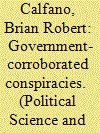

|
|
|
|
|
| Summary/Abstract |
Accusations of conspiracy are nothing new in American politics, but examples in which the government—usually cast as a key player in conspiracy theories—goes on record to corroborate that a conspiracy occurred are rare. I leveraged an experiment that randomly exposes both college-student and general-public subject pools to information about the 1979 House Select Committee on Assassination report of a probable conspiracy in the assassination of President John F. Kennedy. I find that those exposed to government corroboration of a conspiracy (1) are more prone to anger in response to the government report; (2) engage in an increased search of available media information about the assassination; and (3) are more likely to agree with the conclusion of a conspiracy in Kennedy’s murder. Implications for additional research about government pronouncements on controversial issues and follow-on public reaction also are discussed.
|
|
|
|
|
|
|
|
|
|
|
|
|
|
|
|
| 10 |
ID:
171287
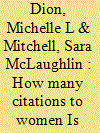

|
|
|
|
|
| Summary/Abstract |
Recent studies identified gendered citation gaps in political science journal articles, with male scholars being less likely to cite work by female scholars in comparison to their female peers. Although journal editors, editorial boards, and political scientists are becoming more aware of implicit biases and adopting strategies to remedy them, we know less about the proper baselines for citations in subfields and research areas of political science. Without information about how many women should be cited in a research field, it is difficult to know whether the distribution is biased. Using the gender distribution of membership in professional political science organizations and article authors in 38 political science journals, we provide scholars with suggested minimum baselines for gender representation in citations. We also show that women represent a larger share of organization members than the authors in sponsoring organizations’ journals.
|
|
|
|
|
|
|
|
|
|
|
|
|
|
|
|
| 11 |
ID:
171277
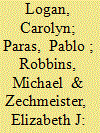

|
|
|
|
|
| Summary/Abstract |
Data quality in survey research remains a paramount concern for those studying mass political behavior. Because surveys are conducted in increasingly diverse contexts around the world, ensuring that best practices are followed becomes ever more important to the field of political science. Bringing together insights from surveys conducted in more than 80 countries worldwide, this article highlights common challenges faced in survey research and outlines steps that researchers can take to improve the quality of survey data. Importantly, the article demonstrates that with the investment of the necessary time and resources, it is possible to carry out high-quality survey research even in challenging environments in which survey research is not well established.
|
|
|
|
|
|
|
|
|
|
|
|
|
|
|
|
| 12 |
ID:
171275


|
|
|
|
|
| Summary/Abstract |
This article focuses on two commonly used indicators of turnout, VAP turnout (the number of votes cast as a percentage of the voting-age population) and RV turnout (votes cast as a percentage of the number of registered voters), and discusses possible biases induced by migration flows. Using a global dataset on elections in more than 100 democracies between 1990 and 2012, we tested the potential bias induced by the percentage of resident noncitizens and nationals living abroad on VAP and RV turnout, respectively. Through time-series cross-sectional analysis, we found that the number of resident noncitizens negatively biases VAP turnout, to the extent that a country with 10% noncitizen residents would have turnout underreported by nearly 4 percentage points. In contrast, we found that the number of nationals living abroad does not induce a turnout bias.
|
|
|
|
|
|
|
|
|
|
|
|
|
|
|
|
| 13 |
ID:
171278
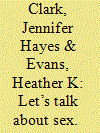

|
|
|
|
|
| Summary/Abstract |
This article examines the factors that influence whether members of Congress tweet about the #MeToo movement. Whereas social-identity theory suggests that congresswomen would be more likely to tweet about #MeToo, congressional research argues that increased polarization has resulted in congresswomen bucking gender stereotypes and embracing more partisan behavior than might otherwise be expected (Pearson and Dancey 2011). We examine how gender, partisanship, and ideology shape the Twitter activity of members of Congress surrounding the #MeToo movement using an original dataset of their tweets since October 2017 when the #MeToo movement gained prominence on Twitter. Our findings show that gender and ideology are the strongest predictors of whether Congress members tweet about the #MeToo movement. Liberals—particularly liberal women—are leading the charge in bringing prominence to the #MeToo movement on Twitter.
|
|
|
|
|
|
|
|
|
|
|
|
|
|
|
|
| 14 |
ID:
171291


|
|
|
|
|
| Summary/Abstract |
We piloted a pedagogical experiment to find out whether students can benefit from explicit demonstrations on critical thinking skills through live debates between two instructors on current political issues that are relevant to but not necessarily a specific part of the curriculum. The empirical results show that, through a series of interventions in the form of explicit demonstrations and debriefs on critical thinking skills in these issue-based live debates, students’ academic performance can significantly improve over a relatively short period of time. Training students’ critical skills through explicit, engaging pedagogy is not only economical in practical and pragmatic terms but also has significant and immediate short-term effects in a setting where there is a high proportion of first-generation undergraduate students of varying abilities and backgrounds.
|
|
|
|
|
|
|
|
|
|
|
|
|
|
|
|
| 15 |
ID:
171293
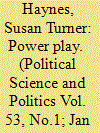

|
|
|
|
|
| Summary/Abstract |
One of the most alarming trends of the past decade has been the rise in authoritarianism and the growing support of strongman politics among citizens of democratic regimes. College instructors have a unique opportunity to challenge such thinking at a time when many of their students are still forming their political beliefs. Using a game, instructors not only can show students the perils of authoritarianism, they also can potentially expand students’ appreciation of democracy. This article describes a game suitable for this purpose. Students take on the role of workers, soldiers, and rulers in a military dictatorship to learn about the “guns-and-butter tradeoff” and authoritarian uncertainty.
|
|
|
|
|
|
|
|
|
|
|
|
|
|
|
|
| 16 |
ID:
171285
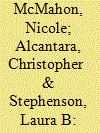

|
|
|
|
|
| Summary/Abstract |
Most political scientists self-identify as a comparativist, theorist, Americanist, or another label corresponding with the qualifying field exams (QFE) that they passed during their doctoral studies. Passing the QFE indicates that a graduate student or faculty member is broadly familiar with the full range of theories, approaches, and debates within a subfield or research theme. The value of the QFE as a form of certification, however, depends on the extent to which the subfield or theme is cohesive in and of itself as well as whether departmental lists draw on a common pool of publications. This article investigates the value of the QFE by examining the cohesiveness of 16 Canadian politics PhD QFE lists. Our findings suggest that it is problematic to assume that scholars who pass a QFE share a common knowledge base.
|
|
|
|
|
|
|
|
|
|
|
|
|
|
|
|
| 17 |
ID:
171282


|
|
|
|
|
| Summary/Abstract |
A growing body of research investigates the factors that enhance the research productivity and creativity of political scientists. This work provides a foundation for future research, but it has not addressed some of the most promising causal hypotheses in the general scientific literature on this topic. This article explicates the latter hypotheses, a typology of scientific career paths that distinguishes how scientific careers vary over time with respect to creative ambitions and achievements, and a research agenda based on the preceding components for investigation of the publication success of political scientists.
|
|
|
|
|
|
|
|
|
|
|
|
|
|
|
|
| 18 |
ID:
171289


|
|
|
|
|
| Summary/Abstract |
Studies investigating gender gaps in the doctoral training of political science students have focused so far overwhelmingly on the US context. Although important research within this context has made strides in identifying the persistent challenges to women’s incorporation in political methodology, much remains unknown about whether women and men have different experiences in methods training during their PhD programs. We contribute to this debate by analyzing data from an original survey on the methods-training experiences of political science PhD students at different European universities. We assess whether gender gaps exist with respect to PhD students’ methods training and confidence in employing methods skills. Our findings show that women cover significantly fewer methods courses in their doctoral training. When women do participate in methods training, they show levels of method employment similar to their male colleagues. We discuss the implications of these findings in the context of European doctoral training.
|
|
|
|
|
|
|
|
|
|
|
|
|
|
|
|
| 19 |
ID:
171283


|
|
|
|
|
| Summary/Abstract |
Book workshops are widely regarded as yielding important benefits for junior scholars; therefore, these intensive feedback sessions have proliferated in recent years. However, closer consideration suggests some important notes of caution. A wealth of additional suggestions does not necessarily improve a post-dissertation manuscript; instead, comments and criticisms advanced by senior experts may induce young authors to back away from or tone down innovative ideas or to address numerous additional factors and conditions, which can make their theory unwieldy and complicated. More important than the potential pitfalls for the first book itself are the heavy opportunity costs created by book workshops, which can jeopardize a junior colleague’s career advancement. After all, the substantial revisions arising from these feedback sessions take time away from article production and the design and initial research for a second major project. In these ways, overinvestment in the first book can hurt a young scholar’s chances at tenure time.
|
|
|
|
|
|
|
|
|
|
|
|
|
|
|
|
|
|
|
|
|